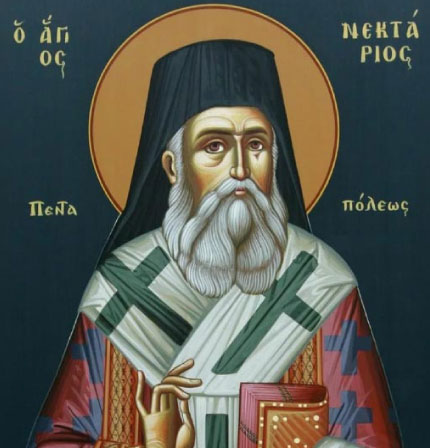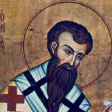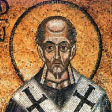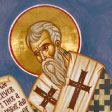Saint Nectarios of Aegina

The Life and Mission of Saint Nectarios of Aegina.
In the quiet bliss of the Greek islands, with its hummed lampadas and pious prayers, the life of Saint Nectarios of Aegina was a living example of modesty, patience and faith. The story of his suffering and triumph is not just a story of one man’s holiness but of the eternal power of grace and of the life-transforming endurance of pain through love.
Early Life and Education
Saint Nectarios was born Anastasios Kephalas in 1846 in Selymbria, Thrace, a town in the province of Thrace. He carried a spark of divine desire in his heart, from childhood, which would lead him towards a devoted spiritual life. He came from a poor family, but he had faith. Anastasios’ love of knowledge and prayer made him an intrepid young boy who regularly absorbed the Holy Scriptures and helped at his local church.
After a basic education, he moved to Constantinople, where he worked as a shopkeeper to fund his studies. Here, amid the tumult of trade and the misery of poverty, he sharpened his faith, going to church with regularity and routinesly studied the Bible. These early years trained him in the virtues of humility and persistence that would become the hallmarks of his ministry.
Entrance into Monastic Life
When Anastasios turned 30, he became a monk on the island of Chios and received the name Lazarus. His ascetic discipline and deep devotion to his fellow priests immediately impressed his superiors. After much service, he was tonsured a monk and renamed Nectarios, a reference to the divine "nectar" that he would pour on the faithful in the future.
Saint Nectarios was ordained as a priest in 1885, and later promoted to the rank of Archimandrite. His reputation for piety and brilliant preaching spread rapidly. He was also known to console the sick, to heal rifts in his flock, and to stir others to greater faith. His sermons were not intellectual monologues but wells of spiritual life, fragranced with the Holy Spirit.
Ministry in Egypt and Reprehensible Interrogation
Saint Nectarios’ voyage had led him to Alexandria in Egypt where he was the Metropolitan of Pentapolis under the Patriarch of Alexandria, Sophronius. His time there, however, evolved into a constant spiritual challenge. Although popularly admired for his generous heart and unflagging work, he was fiercely opposed by jealous clergy. Suspicions, forged from envy and jealousy, were levelled at him, and he was unfairly dismissed.
With his removal from his post by the Patriarchate, Saint Nectarios found himself in great shambles. Deprived of honour and banished from Alexandria, he escaped to Greece. Yet, like gold polished in the furnace, his heart was clearer, free of anger or despair. St Nectarios was the humble man of Christ in the midst of treachery, and he endired his enemies and submited to the will of God.
Foundation of the Convent and Continuum.
Back in Greece, Saint Nectarios devoted himself to theological training as director of the Rizarios Ecclesiastical School in Athens. His arrival transformed the school into a vibrant centre of spiritual and academic endeavour. He fathered his students, teaching them humility, prayer and a total faith in God.
Towards the end of his life, Saint Nectarios retired to the island of Aegina, where he founded the Holy Trinity Convent. There, among a handful of nuns, he lived a life of prayer, labour and pastoral service. His days were spent in the simplicity and quietness of the monastic life, but his sanctity could not remain concealed. Travellers visited Aegina, seeking advice, healing and comfort from the saint.
Miracles started to come along with his work – the sick were cured, the blind were given eyes, and sinners whose souls had become so weak found rest. Yet Saint Nectarios himself still refused all praise, attributing these miracles on the mercy of God. His humility was still his greatest garment.
Sleeping With the Lord and Canonization.
In 1920, after a long illness, Saint Nectarios entered the Lord’s presence at the age of 74. Even when he died, the scent of holiness permeated him. His body was lying in repose and the room smelled like heaven, and most of the sick who touched his cloaks were healed.
His canonisation by the Ecumenical Patriarchate in 1961 vindicated what everyone had already understood – that Saint Nectarios existed within the cloud of witnesses, praying for the Church and leading those who invoke his name. His remains, housed in Aegina, remain a source of miracles, attracting visitors from all over the globe.
Legacy and Spiritual Lessons
Saint Nectarios’s life provides an active model for Christ’s Beatitudes. He was persecuted in the name of righteousness, but his heart was pure, and people found God in him. His perseverance reveals to us that what God allows us to suffer is not something to be terrified by because it sanctifies the soul and draws us nearer to his light.
Saint Nectarios’ ministry in word and deed teaches us that holiness demands humility, forgiveness and constant prayer. When we see his life, we witness the endless love of Christ – the love that bears all things, believes all things, hopes all things, and endures all things.
At a time when passion dominates sacrifice and material wealth trumps the spiritual, Saint Nectarios provides a beaitiful example of the power of the Cross, wiser than the men. May his prayers for us strengthen us and may his life encourage us to travel down the narrow road that leads to the Kingdom of Heaven.







